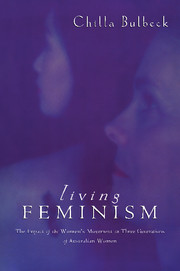Book contents
- Frontmatter
- Contents
- List of Tables
- Preface
- List of Women Who Told their Biographies for the Book
- Abbreviations
- Introduction
- Part One Women's Lives Through A Feminist Lens
- Part Two Present and Future Feminisms
- 5 Finding Feminism
- 6 Is Feminism a White Middle-class Movement?
- 7 Beating the Backlash
- Conclusion
- Appendix 1
- Appendix 2
- Notes
- Bibliography
- Index
5 - Finding Feminism
Published online by Cambridge University Press: 20 May 2010
- Frontmatter
- Contents
- List of Tables
- Preface
- List of Women Who Told their Biographies for the Book
- Abbreviations
- Introduction
- Part One Women's Lives Through A Feminist Lens
- Part Two Present and Future Feminisms
- 5 Finding Feminism
- 6 Is Feminism a White Middle-class Movement?
- 7 Beating the Backlash
- Conclusion
- Appendix 1
- Appendix 2
- Notes
- Bibliography
- Index
Summary
Passages To and From Women's Liberation
brought up to please, we are without a sense of ourselves.
(Deborah McCullough in 1975 in Chesterman 1993:185)It took a while for women in general to take the opportunities the feminist movement offered up for them. Look at me, tentative about going on to uni. study, didn't learn to drive until I was in my thirties, never went to the movies by myself till I was married for about ten years. It's scary to step out and say, ‘Yes, I'll have some of that freedom’, it required a decision – how much freedom? Where does it stop? It required accepting responsibility for your own actions, decisions and life I guess.
(Grace)Feminism was suggested to women by incidents as major as the shame of rape or an unwanted pregnancy, as pressing as equal wages, or as apparently superficial as unequal access to leisure facilities. As people act they change, if but slowly, the structures in which we are embedded. We create and recreate our own identities, as working-class women, as Greek–Australian women, as urban Indigenous Australian women. But in the process and by our own practices, we add to society's repertoire of ways of ‘doing’ those identities. From their encounters with feminism, the ‘mothers’ in my sample went on to divorces, secondary study, asking husbands to share housework more equally, demanding better conditions at work, or going to the movies alone.
- Type
- Chapter
- Information
- Living FeminismThe Impact of the Women's Movement on Three Generations of Australian Women, pp. 128 - 155Publisher: Cambridge University PressPrint publication year: 1997

